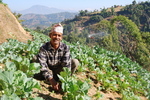International Development Enterprise partner with Government to provide low cost irrigation technologies in Nepal
International Development Enterprise (IDE) is a development organization that operates in 11 countries worldwide with the aim of creating income opportunities for poor rural households in developing countries. IDE Nepal was established in 1992 with the aim of developing low-cost irrigation technologies suitable for smallholders in rural Nepal. More than 80% of the people in Nepal are engaged in agriculture and a significant number of them have smallholdings. IDE realized that small holdings of these poor farmers can be effectively utilized for growing vegetables, if the farmers were provided with suitable technology for irrigation and water management and knowledge inputs for managing the vegetable farming process.
IDE thus enhances farm productivity of poor farmers and increases their income by providing them with low-cost irrigation technologies and knowledge of farm management. In order to ensure that increased farm productivity results in increased farm income, IDE links farmers to markets. In addition, IDE has started linking farmers’ communities with financial institutions and is in the process of enabling a credit model where the community can jointly provide guarantee to loans made to the individual member. IDE works closely with Nepalese government institutions for long term sustainability of its initiatives. Today, IDE Nepal operates in 22 districts in Nepal having reached more than 1.4 million poor farmers in 240,000 households in rural Nepal. Its programmes have resulted in the sale of 200,000 treadle pumps and 40,000 drip irrigation systems. It is estimated that IDE interventions have generated an additional income of US$150 per year for each of the 240,000 households whom they have reached.


